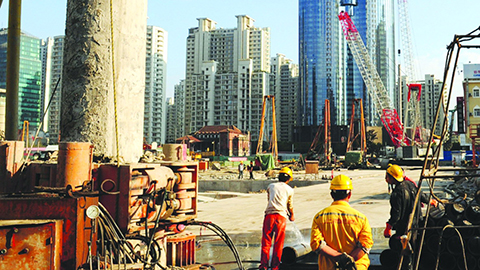 SHANGHAI: Laborers work at a new property development under construction on the busy Nanjing Road shopping street in Shanghai.
SHANGHAI: Laborers work at a new property development under construction on the busy Nanjing Road shopping street in Shanghai.BEIJING: China's public-private partnership (PPP) project construction has entered the "fast lane" and will become a unified, standardized, transparent market, a government research office said. As of the end of June, there were 13,554 projects nationwide with investment of 16.3 trillion yuan ($2.4 trillion), according to data from the China Public Private Partnerships Center, the official Xinhua news agency said yesterday.
More than 34 percent of projects had reached the implementation phase, it said. "Our country's public-private partnership project construction has enter the fast lane, an active period," Xinhua cited Wang Yiming, deputy director of the State Council Development Research Center, as saying.
But Wang warned that as more projects moved from construction to operations, more risks were exposed, such as excessive financing that has led to high financial leverage and debt-to-capital ratios, and impractical projects in rural areas. In recent years, the government has tightened controls on new local government debt to help ward off risks following a borrowing binge since the global financial crisis.
Authorities have also vowed to prevent local governments from using public-private partnerships, government investment funds and government procurement services as "disguised channels" for raising debt. The State Council, China's cabinet, has said resolving local debt risks was important to ensure the country's economic and fiscal sustainability and financial safety.
China's total private and public debt has exceeded 250 percent of gross domestic product, up from 150 percent before the global financial crisis, according to the Organization for Economic Cooperation and Development.
Construction
Luxury lakeside homes and high-rise condominiums are coming up fast in China's sleepy inland town of Bengbu, a clear sign that a home-buying frenzy sweeping across the country's major metropolises and provincial capitals has reached even its smaller cities. The increase in demand is welcome news for smaller cities that have a massive overhang of unsold houses left from the last real estate downturn three years ago. However, the surge in construction threatens to outpace or match the increased demand for housing, leaving housing inventories untouched.
That will be a worry for China's policymakers, who want to keep the real estate market stable ahead of a once-every-five-years Communist Party congress in the autumn that will see a reshuffle of senior leaders. The property market in Bengbu, once a fishing village on the banks of the Huai River and Lake Longzi, has been among the top three fastest-growing in China's 70 main cities in recent months although the local economy is soft - the region's main glass-making industry has been hit by the general growth slowdown.
Property analysts say property demand in such smaller cities has surged because local governments offer cheap credit and impose next to no restrictions, unlike in the bigger cities, where defenses are in place to fend off speculation and prevent formation of property bubbles. Real estate in tier-3 and tier-4 cities, ranked below the major metropolises and the provincial capitals, is where the growth is now, analysts say, but the frenzied construction means the stock of unsold homes has remained stubbornly high.
Nearly 50 million square meters of real estate, or about 550,000 homes, were sold in 27 tier-3 cities in January-May this year, which should have reduced inventories by 45 percent, according to Reuters calculations based on a private estimate of inventories in China's main small cities. In reality, inventories only dropped 7.1 percent to 102 million sq m, equivalent to 1.1 million homes, data by Shanghai-based E-house China R&D Institute showed, because of new construction.
Prices for new homes in Bengbu surged 3.4 percent on-month in May, the highest among all 70 major cities, data from the Statistics Bureau showed. Bengbu ranked second-highest in April and third-highest in June. "We think the market will continue to be good even though we don't expect a drastic rise in prices anymore," said a manager surnamed Huang at Bengbu Jinhui Real Estate, a private developer that has actively bought land rights in Bengbu.
A unit of Kingyard Real Estate, the firm successfully bid 1.39 billion yuan ($205.4 million) for a nearly 12,000 sq m (3 acres) parcel of land in Bengbu in May, more than double the starting price, where it plans to build residential housing. - Agencies










